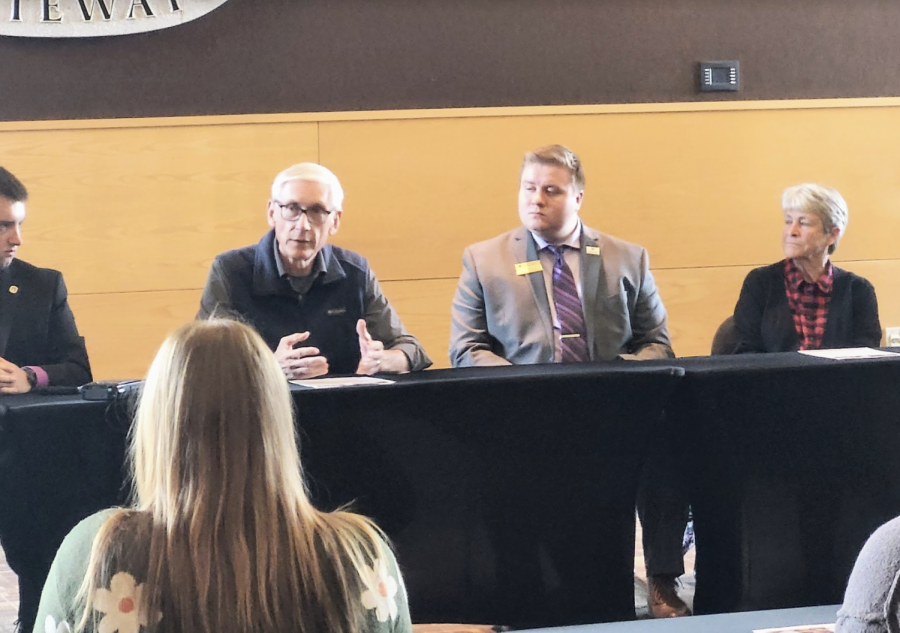Then comes the capital budget, or building plan.
Both go to the Legislature for consideration, and in this case Democratic Gov. Tony Evers is again dealing with a GOP-dominated Assembly and Senate.
In the first Evers term, GOP lawmakers reduced the size of the building budget. For example, two years ago, Evers proposed a nearly $2.4 billion capital budget. Republican lawmakers pared that back to
$1.5 billion. And insiders say something similar is likely again.
This time he is proposing a $3.8 billion capital budget.
Joint Finance Senate Co-chair Howard Marklein, R-Spring Green, said Evers’ proposal will “have to go through the normal process,” while Assembly Co-chair Mark Born, R-Beaver Dam, said changes are coming.
“The Governor’s Capital Budget recommendation is more of the same as we saw in his budget recommendation — massive spending and unrealistic growth,” Born said. “The Legislature’s Capital Budget will make important investments in our state’s infrastructure and ensure we’re in a strong position for the future.”
But this year there are some twists with tasty finish:
— Evers’ proposed $3.8 billion capital budget would finance half of the projects with cash instead of borrowing.
Evers’ office estimated the move — using a portion of the state’s projected $7.1 billion surplus at the end of this fiscal year June 30 — would save $1 billion in debt payments over the 20 years that building projects are normally financed using bonds.
“Our historic surplus means we have historic opportunity and responsibility — to invest in key projects that have long been neglected while still staying well within our means, keeping borrowing low, and saving taxpayers money in the long run, and that’s exactly what our Capital Budget does,” Evers said.
— The bulk of Evers’ new plan would set aside $1.8 billion for projects on UW System campuses. The biggest proposed project is $347.4 million to demolish the computer-aided engineering facility and build
a replacement on the Madison campus. Evers also wants to put $441.5 million into various maintenance and renovation projects, from overhauling instructional space to replacing utilities.
— Evers is also calling for $150 million for juvenile justice facilities.
That includes covering $32.6 million in higher-than-expected costs for a planned type 1 facility in Milwaukee County to house the state’s most serious youth offenders in the system.
That project has already been enumerated and sited and is part of the long-delayed effort to close the troubled Lincoln Hills and Copper Lake youth lock-ups in northern Wisconsin. The Department of
Corrections pegged the higher cost to inflation and significant increases in labor costs.
In 2018, the Capitol rushed through legislation seeking to close the facilities by early 2021. It included $80 million in borrowing with half slated to help counties build lower-security youth facilities along with expanding the Mendota Juvenile Treatment Center in Madison, which houses those with mental health problems, and constructing one or more new type 1 facilities. That bill included a deadline to close
Lincoln Hills and Copper Lake by Jan. 1, 2021; that was pushed back to mid-2021 and abandoned as efforts to overhaul the youth system went through several revisions.
Evers’ proposal also calls for $83 million to construct a second type 1 facility in Dane County, $4 million to find a location for a third in northeastern Wisconsin and $24.9 million to expand the Grow Academy
in Oregon.
The Dane County type 1 facility would be built in property the Department of Corrections now owns in Oregon. That land also houses the Grow Academy, a residential program that treats county and
state-supervised youth as an alternative to incarceration. Evers wants to add 10 beds to that six-bed facility. The state also has a medium security adult prison there.
The new type 1 facility in Milwaukee County is expected to be completed in May 2026. The new Dane County facility would have a target completion date of May 2029.
If all three were approved, the state would have capacity for 96 juvenile offenders.
There were 56 male offenders at Lincoln Hills as of Friday and five females at Copper Lake. As part of the plan to overhaul the system, the young women now housed at Copper Lake are slated to move into an
expanded Mendota Juvenile Treatment Center.
Evers also wants to put $5.7 million into a new HVAC system at the current youth prisons in northern Wisconsin as Lincoln Hills and Copper Lake are converted to a minimum security adult facility.
–Increasing the Wisconsin History Museum budget by $60.5 million. The project in downtown Madison has already been enumerated, and the revised cost would push the price tag to $160.5 million. That would include $70 million in general fund-supported borrowing, $48.2 million in gifts and $42.3 million in cash.
–Providing $15 million in cash from the state toward the cost of a sports and convention center in Janesville. The overall price tag is $50.5 million with the rest of the cost covered by gifts. The project
includes a 250-person multipurpose arena, space for trade shows as well as sports such as basketball and volleyball and replacing a 50-year-old single sheet ice arena, where the Janesville Jets play.
–Setting aside $9.3 million for a new 8,000-capacity soccer stadium that will host a professional team in Milwaukee. The project has an overall price tag of $45 million with the rest of the cost covered by gifts. The stadium is also scheduled to be home to the Marquette University men’s and women’s soccer teams.
–Earmarking $12.5 million to renovate the existing cream puff building at the Wisconsin State Fair Park. That includes $6.5 million in program revenue-supported borrowing and $6 million in cash.
So if you like cream puffs, this building plan might suit your tastes.
For more, visit WisPolitics.com
The Capitol Report is written by editorial staff at WisPolitics.com, a nonpartisan, Madison-based news service that specializes in coverage of government and politics, and is distributed for publication by members of the Wisconsin Newspaper Association.
Copyright © WisPolitics.com













